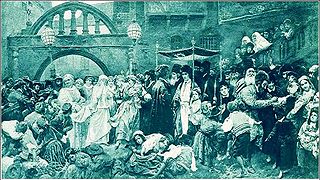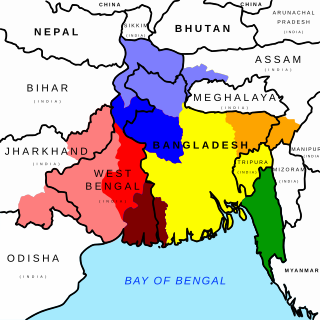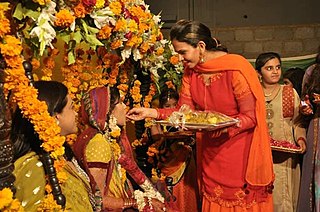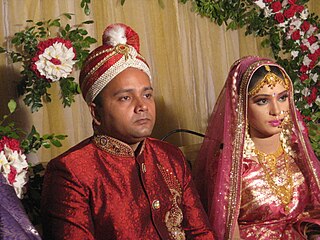
A wedding is a ceremony where two people are united in marriage. Wedding traditions and customs vary greatly between cultures, ethnic groups, races, religions, denominations, countries, social classes, and sexual orientations. Most wedding ceremonies involve an exchange of marriage vows by a couple, presentation of a gift, and a public proclamation of marriage by an authority figure or celebrant. Special wedding garments are often worn, and the ceremony is sometimes followed by a wedding reception. Music, poetry, prayers, or readings from religious texts or literature are also commonly incorporated into the ceremony, as well as superstitious customs.
A white wedding is a traditional formal or semi-formal wedding originating in Great Britain.

A wedding reception is a party usually held after the completion of a marriage ceremony as hospitality for those who have attended the wedding, hence the name reception: the couple receive society, in the form of family and friends, for the first time as a married couple. Hosts provide their choice of food and drink, although a wedding cake is popular.

An engagement or betrothal is the period of time between the declaration of acceptance of a marriage proposal and the marriage itself. During this period, a couple is said to be fiancés, betrothed,intended, affianced, engaged to be married, or simply engaged. Future brides and grooms may be called fiancée (feminine) or fiancé (masculine), the betrothed, a wife-to-be or husband-to-be, respectively. The duration of the courtship varies vastly, and is largely dependent on cultural norms or upon the agreement of the parties involved.

A groomsman or usher is one of the male attendants to the groom in a wedding ceremony. Usually, the groom selects close friends and relatives to serve as groomsmen, and it is considered an honor to be selected. From his groomsmen, the groom usually chooses one to serve as best man.
A honeymoon registry is a service, typically on the Internet, that assists engaged and married couples in financing their honeymoons.

A Jewish wedding is a wedding ceremony that follows Jewish laws and traditions. While wedding ceremonies vary, common features of a Jewish wedding include a ketubah which is signed by two witnesses, a chuppah or huppah, a ring owned by the groom that is given to the bride under the canopy, and the breaking of a glass.

The traditional Vietnamese wedding is one of the most important ceremonies in Vietnamese culture, which is influenced by Confucian and Buddhist ideologies.
Etiquette rules in the United States and Canada generally apply to all individuals, unlike cultures with more formal class structures, such as those with nobility and royalty.

A Bengali Muslim wedding is a Bengali wedding in accordance to Muslim faith.
Iranian wedding, also known as Persian wedding, consists of traditions rooted in Zoroastrianism, the primary religion of pre-Islamic Iran. Though the concepts and theories of marriage have been changed by Islamic traditions, the ceremonies have remained more or less the same as they were originally in pre-Islamic Iran. Although modern-day Iran is a multi-ethnic country, Iranian wedding traditions are embraced by the majority of ethnic groups in Iran.

Marriage in Pakistan pertains to wedding traditions established and adhered by Pakistani men and women. Despite their local and regional variations, marriages in Pakistan generally follow Islamic marital jurisprudence. Marriages are not only seen as a union between a husband and a wife, but also an alliance between their respective families. These traditions extend to other countries around in the world where Overseas Pakistani communities exist.
Icelandic weddings today still observe some traditional customs, such as seating by gender and the high table.

Traditional Russian weddings can last between two days and one week. The celebration usually involves dancing, singing, toasting, and banqueting. The best man and bridesmaid are called "Witnesses" or "Свидетели" in Russian. The ceremony and the ring exchange take place on the first day of the wedding. Russian weddings ceremonies have undertaken a certain amount of Western traditions, including incorporating maids of honour into the wedding party.
In the United States and Canada, weddings follow traditions often based on religion, culture, and social norms. Most wedding traditions in the United States and Canada were assimilated from other, generally European, countries. Marriages in the U.S. and Canada are typically arranged by the participants and ceremonies may either be religious or civil. There is a tradition that the prospective bridegroom ask his future father-in-law for his blessing.

Traditional marriage customs in the Philippines and Filipino wedding practices pertain to the characteristics of marriage and wedding traditions established and adhered by them Filipino men and women in the Philippines after a period of adoption courtship and engagement. These traditions extend to other countries around the world where Filipino communities exist. Kasalan is the Filipino word for "wedding", while its root word – kasal – means "marriage". The present-day character of marriages and weddings in the Philippines were primarily influenced by the permutation of Christian, both Catholic and Protestant, Hindu, Islam, Chinese, Spanish, and American models.

Muslim marriage and Islamic wedding customs are traditions and practices that relate to wedding ceremonies and marriage rituals prevailing within the Muslim world. Although Islamic marriage customs and relations vary depending on country of origin and government regulations, both Muslim men and women from around the world are guided by Islamic laws and practices specified in the Quran. Islamic marital jurisprudence allows Muslim men to be married to multiple women.

The Azerbaijani wedding tradition is one of the most significant and solemn family traditions of Azerbaijani people. It is multi-stepped, and is related to various compulsory rituals and traditions. Ancient Azerbaijani weddings reflect cycles of traditions, lasting for a long period of time, and need significant material costs.
Weddings in Myanmar, considered auspicious occasions in Burmese culture, reflect various ethnic, religious, and regional traditions. Depending on an individual's family social economic status, personal preferences and titles held, Burmese weddings can be religious or secular, and extravagant or simple. Wedding expenses are covered by the groom's family. Myanmar is a predominantly Buddhist country, and many wedding customs and traditions are influenced by Buddhism.











